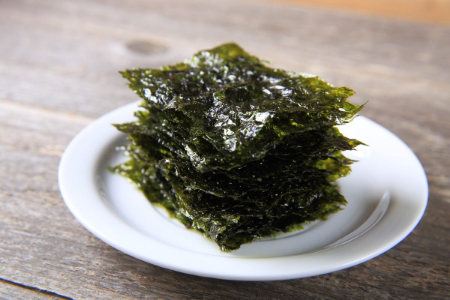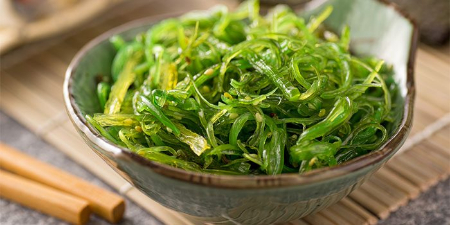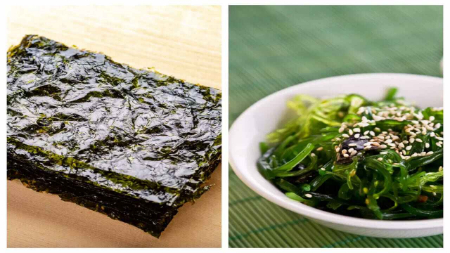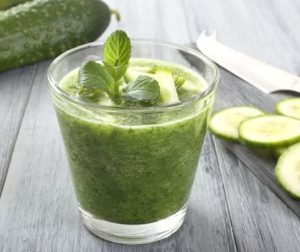Seaweed or sea vegetables are different types of algae that grow in the sea. These plants are a source of food for marine creatures and their colors range from red and green to brown and black.
Seaweed grows along rocky shores around the world, but its consumption is more common in Asian countries such as Japan, Korea, and China. This food item is very versatile and can be used in a variety of foods, including sushi rolls, soups and stews, salads, supplements, and smoothies.

Benefits of seaweed
In addition, seaweed is highly nutritious, and consuming a small amount of it has many benefits. In the following, we mention the benefits of seaweed that have been confirmed with scientific support:
1. Contains iodine and tyrosine, supporting thyroid function
The thyroid gland secretes hormones that help control growth, energy production, reproduction, and repair of damaged cells in the body. The thyroid needs iodine to make hormones. With iodine deficiency, you may experience symptoms such as weight changes, fatigue, or neck swelling over time.
The Recommended Daily Intake (RDI) of iodine for adults is 140 micrograms per day.
Seaweed has a unique ability to absorb large amounts of iodine from the ocean. Its iodine content strongly depends on the type of algae, its location and processing method. In fact, one dried sheet of seaweed can provide 11-1999 percent of the daily recommended amount.
In the following, the average iodine content of three different types of dried seaweed is given:
• Nori: 37 micrograms per gram (25% of the daily recommended amount)
Wakame: 139 micrograms per gram (93% of the daily recommended amount)
Combo: 2,523 micrograms per gram (1,682% of the daily recommended amount)
Kelp is one of the best sources of iodine. Just one teaspoon (3.5 grams) of dried kelp can contain 59 times the recommended daily amount.
Seaweed also contains an amino acid called tyrosine, which, along with iodine, is used to make two key hormones that help the thyroid gland function properly.
2. Good source of vitamins and minerals
Each type of seaweed has a unique set of nutrients. Sprinkling some dried algae on your food not only adds more flavor, texture and flavor to your food, but it’s an easy way to increase your intake of vitamins and minerals.
In general, 1 tablespoon (7 grams) of dried spirulina can provide:
• Calories: 20
Carbohydrates: 1.7 grams
• Protein: 4 grams
• Fat: 0.5 grams
• Fiber: 0.3 grams
• Riboflavin: 20% of the daily recommended amount
• Thiamine: 14% of the daily recommended amount
• Iron: 11% of the daily recommended amount
• Manganese: 6% of the daily recommended amount
• Copper: 47% of the daily recommended amount
Seaweed also contains small amounts of vitamins A, C, E, and K, along with folate, zinc, sodium, calcium, and magnesium.
While it may only provide a small percentage of some of the recommended daily amounts, using it as a condiment once or twice a week is an easy way to add more nutrients to your diet.
The proteins in some algae, such as spirulina and chlorella, contain all the essential amino acids. This means that seaweed can help you get the full range of amino acids you need. Seaweed can also be a good source of omega-3 fats and vitamin B12.
3. It contains a variety of protective antioxidants
Antioxidants can make your body’s unstable substances called free radicals less reactive. This makes them less likely to damage your cells.
In addition, excessive production of free radicals is considered an underlying cause of several diseases, such as heart disease and diabetes.
In addition to containing antioxidant vitamins A, C, and E, seaweed contains a wide range of beneficial plant compounds, including flavonoids and carotenoids. These have been shown to protect your body’s cells from free radical damage. Much research has focused on a specific carotenoid called fucoxanthin.
It is the main carotenoid found in brown algae such as wakame and has 13.5 times the antioxidant capacity of vitamin E. Fucoxanthin has been shown to protect cell membranes better than vitamin A. While the body does not always absorb fucoxanthin well, its absorption may be improved by taking it with fat.
However, seaweed contains a wide variety of plant compounds that work together to produce powerful antioxidant effects.
4. Provides fiber and polysaccharides that can boost your gut health
Gut bacteria play a very important role in your health. It is estimated that there are more bacterial cells in your body than human cells. An imbalance in “good” and “bad” gut bacteria can lead to disease and failure.
Seaweed is an excellent source of fiber known to promote gut health. Fiber can make up 25-75% of the dry weight of seaweed. This amount is higher than the fiber content of most fruits and vegetables.
Fiber resists digestion and is instead used as a food source for your colon bacteria. In addition, studies have shown that certain sugars found in seaweed, called sulfated polysaccharides, increase the growth of “good” gut bacteria. These polysaccharides can also increase the production of short-chain fatty acids (SCFA), which support and nourish the cells lining your gut.

5. It may help you lose weight by delaying hunger and weight loss
Seaweed contains a lot of fiber without any calories. Also, the fiber in seaweed may slow gastric emptying. This will help you feel fuller for longer and can prevent premature hunger.
In addition, seaweed is also considered to have anti-obesity effects. In particular, several animal studies suggest that a substance in seaweed called fucoxanthin may help reduce body fat.
One animal study found that mice fed fucoxanthin lost weight, while mice fed a control diet did not.
The results showed that fucoxanthin increases the expression of fat metabolizing protein in mice.
Other animal studies have shown similar results. For example, fucoxanthin has been shown to significantly lower blood sugar levels in mice and promote greater weight loss. Although the results in animal studies seem very promising, it is necessary to conduct human studies to confirm these findings.
6. It may reduce the risk of heart disease
Heart disease is the leading cause of death worldwide. Factors that increase your risk include high cholesterol, high blood pressure, smoking, and physical inactivity or being overweight. Seaweed may help lower your blood cholesterol levels.
One 8-week study fed hypercholesterolemic rats a high-fat diet supplemented with 10% freeze-dried seaweed. showed that mice had 40% lower total cholesterol, 36% lower LDL cholesterol and 31% lower triglyceride levels.
Heart disease can also be caused by excessive blood clotting. Seaweed contains carbohydrates called fucans, which may help prevent blood clots. In fact, one animal study found that fucan, extracted from seaweed, prevented blood clots as well as an anticoagulant.
Researchers have also begun to look at peptides found in seaweed. Early animal studies suggest that these protein-like structures may block part of the pathway that raises blood pressure in your body. However, large-scale human studies are needed to confirm these results.
7. May help reduce the risk of type 2 diabetes by improving blood sugar management
Diabetes occurs when your body is unable to balance its blood sugar levels over time.
By 2040, 642 million people worldwide are expected to have type 1 or type 2 diabetes. Interestingly, seaweed has become a focus of research for new ways to support people at risk of diabetes. An 8-week study of 60 Japanese people found that fucoxanthin, an ingredient in brown seaweed, may help improve blood sugar control.
Participants received a topical seaweed oil that contained 0 mg, 1 mg, or 2 mg of fucoxanthin. The study found that people who received 2 mg of fucoxanthin improved their blood sugar levels compared to the group who received 0 mg.
The study also noted additional improvements in blood sugar levels in people with a genetic predisposition to insulin resistance, which is commonly associated with type 2 diabetes. In addition, another substance in the seaweed, called alginate, prevented the animals’ blood sugar from rising after they were fed a high-sugar meal. It is thought that alginate may reduce the absorption of sugar into the bloodstream.
Several other animal studies have reported improved blood sugar control when seaweed extract is added to the diet.

Complications and possible dangers of seaweed
Although seaweed is considered a healthy food, consuming too much of it may have potential risks.
Excess iodine
Seaweed can contain very high and potentially dangerous amounts of iodine. Japanese people’s high consumption of seaweed may be one of the reasons they have the highest life expectancy in the world.
However, the average daily intake of iodine in Japan is estimated to be between 1,000 and 3,000 μg (667 and 2,000% of the RDI). This is dangerous for people who consume seaweed every day, as 1,100 micrograms of iodine is the maximum tolerated amount (TUL) for adults.
Fortunately, in Asian cultures, seaweed is commonly eaten with foods that can inhibit iodine absorption by the thyroid gland. These foods are known as goitrogens and are found in foods such as broccoli, cabbage, and Chinese cabbage. Additionally, it’s important to note that seaweed is water-soluble, meaning cooking and processing can affect its iodine content.
For example, when kelp is boiled for 15 minutes, it can lose up to 99% of its iodine content. While a few case reports have linked iodine-containing kelp consumption to thyroid dysfunction, thyroid function has returned to normal after cessation of consumption. However, high amounts of seaweed can affect thyroid function, and the symptoms of iodine excess are often similar to those of iodine deficiency.
If you think you’re consuming too much iodine and experience symptoms like neck swelling or weight fluctuations, cut back on iodine-rich foods and talk to your doctor.
Heavy metal load
Seaweed can absorb and store minerals in a concentrated manner.
This poses a health risk, as seaweed can also contain large amounts of toxic heavy metals such as cadmium, mercury and lead. However, the amount of heavy metals in seaweed is usually lower than the maximum allowed concentration in most countries.
A recent study analyzed the concentrations of 20 metals in 8 different types of seaweed from Asia and Europe.
This study showed that the levels of cadmium, aluminum and lead found in 4 grams of each seaweed do not pose serious health risks. However, if you regularly consume seaweed, it is possible that heavy metals will accumulate in your body over time.
If possible, buy organic seaweed, as it is less likely to contain significant amounts of heavy metals.
Frequently asked questions about seaweed
1. Is seaweed good for the skin?
Using cosmetics containing seaweed may be beneficial for people’s skin. The anti-inflammatory effects of seaweed plus its antioxidant content and bioactive compounds may help improve skin health.
2. Can you eat too much seaweed?
It is possible to eat too much seaweed, especially if it contains high amounts of iodine, which can affect thyroid health. A study suggests that consuming seaweed may cause excessive iodine exposure, which can lead to thyroid disease.
3. What is seaweed?
Seaweed is a type of marine plant that grows in saltwater and oceans. These plants have many color variations and are used as food and supplements in different cultures.
4. What are the different types of seaweed?
There are many types of seaweed such as nori, wakame, kelp, spirulina and chlorella. Each type of seaweed has its own unique taste, texture and nutritional properties.
5. How to consume seaweed?
Seaweed can be consumed in many ways. You can eat it raw, dry or cooked. Seaweed can be used as sashimi, salad, soup, stew, smoothie and food supplement.
6. Is seaweed consumption safe for everyone?
Seaweed is safe for most people to consume. However, pregnant or lactating women, people with thyroid diseases, and people with iodine sensitivities should consult their doctor before consuming seaweed.
final word
Seaweed is an increasingly popular ingredient in cuisines around the world. It is the best food source of iodine to help support your thyroid gland. It also contains other vitamins and minerals such as vitamin K, B vitamins, zinc and iron, along with antioxidants that help protect your cells from damage.
However, too much iodine from seaweed can harm your thyroid function.
For optimal health benefits, enjoy this ancient ingredient in regular but small amounts.





